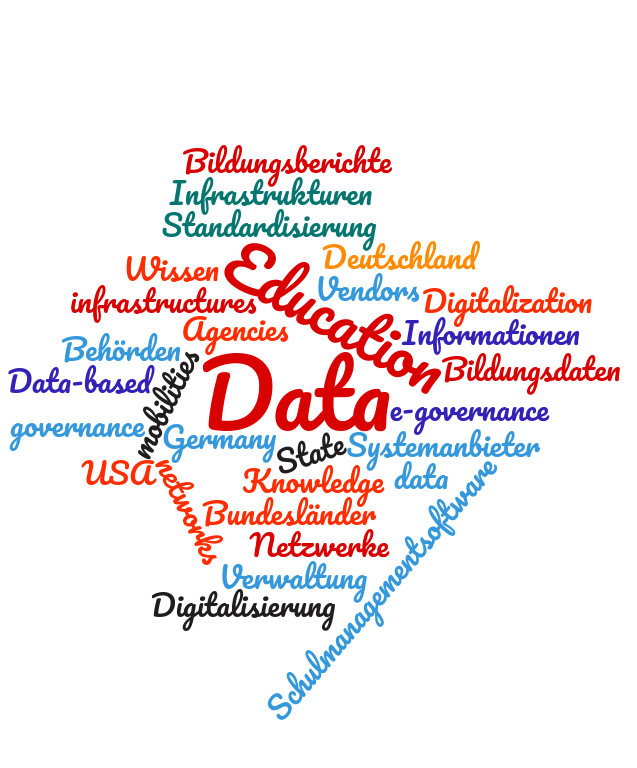A Comparison between Germany and the United States
Funding Agency: German Research Foundation (DFG)
Funding Period: 2017-2020
Principal Investigator: PD Dr. Sigrid Hartong
Research Team Members: M.A. Annina Förschler (Research Fellow), Anouschka Kramer (Student Assistant), Laura Nickel (Student Assistant)
Topic/Goal of Project
This project investigates the implementation and the usage of (multi-level) data infrastructures in education policy from an international-comparative perspective. We understand such data infrastructures as a still under-researched field in education policy, which is closely related to the worldwide “turn” towards educational monitoring and accountability, evidence-based decision-making and digital e-governance. At the same time, however, countries still reveal large differences in the field of data infrastructuralization, e.g. in terms of political initiatives, degrees of standardization, actor constellations or data system characteristics. This seems even more true for countries in which subnational governments hold the main responsibility for educational affairs, which is often mirrored in large differences between state (and district) data systems. Therefore, it seems essential to closely observe how trends of (global) standardization interact with mechanisms of local contextualization in the digitalization of education policy.
Building on this line of argumentation, the project follows a qualitative case study design to explore the ongoing transformation of data infrastructures in state-level administration (including Student Information Systems, monitoring systems, systems for supporting administration or accountability) in Germany and the United States.
Case selection
By selecting Germany and the United States, the project compares two countries which over the past decade have largely expanded their data infrastructures and monitoring systems in education (similar cases), yet in different scope and design (contrasting cases). Also, while in Germany education is mainly ruled by the state departments with little authority of the districts, the US system operates a lot more through local/district-level decision-making (contrasting cases), which seems to crucially affect how data systems become implemented.
Methods
The project combines policy document analyses (e.g. national frameworks for data system implementation), expert interviews (with state-level actors, supra-state experts/agencies and system vendors) and also participatory observations at the state level.
Follow the project on ResearchGate
Project related publications
Hartong, Sigrid; Förschler, Annina & Dabisch, Vito (2021) Data infrastructures and the (ambivalent) effects of rising data interoperability: insights from Germany. In: Wyatt-Smith, Claire; Lingard, Bob & Heck, Elizabeth (Hrsg.) Digital Disruption in Teaching and Testing: Assessments, Big Data, and the Transformation of Schooling, Routledge.
Hartong, Sigrid (2020) The Power of Relation-Making: Insights into the Production and Operation of Digital School Performance Platforms in US State Education Agencies. In: Critical Studies in Education. Link.
Hartong, Sigrid & Förschler, Annina (2020) Dateninfrastrukturen als zunehmend machtvolle Komponente von Educational Governance. Eine Studie zur Implementierung und Transformation staatlicher Bildungsmonitoringsysteme in Deutschland und den USA. In: van Ackeren, Isabell; Bremer, Helmut; Kessl, Fabian; Koller, Hans Christoph; Pfaff, Nicolle; Rotter, Caroline; Klein, Dominique & Salaschek, Ulrich (Eds.) Bewegungen. Beiträge zum 26. Kongress der Deutschen Gesellschaft für Erziehungswissenschaft, Barbara Budrich: 419-432. Link.
Förschler, Annina & Hartong, Sigrid (2020) Datenpraktiken des Schulmonitorings in staatlichen Bildungsbehörden. Beobachtungen jenseits des Regelkreises. In: Fickermann, Detlef; Manitius, Veronika & Karcher, Martin (Hrsg.) DDS Die Deutsche Schule Beiheft 15: Neue Steuerung – Renaissance der Kybernetik?, Waxmann. Link.
Hartong, Sigrid (2020) Zum Optimierungsdrang des Bildungsmonitorings. In: Zeitschrift für Pädagogik, 66(1): 64-71.
Hartong, Sigrid; Breiter, Andreas; Jarke, Juliane & Förschler, Annina (2019) Digitalisierung von Schule, Schulverwaltung und Schulaufsicht. In: Klenk, Tanja; Nullmeier, Frank & Wewer, Göttrik (Eds.) Handbuch Digitalisierung in Staat und Verwaltung, Springer. Link.
Hartong, Sigrid (2019) Learning Analytics und Big Data in der Bildung. Zur notwendigen Entwicklung eines datenpolitischen Alternativprogramms. Documentation of the lecture at the GEW work group “Bildung in der digitalen Welt” , Fulda, 20.09.2019. In: GEW Broschüre Bildung in der digitalen Welt, November 2019. Link.
Hartong, Sigrid & Förschler, Annina (2019) Opening the black box of data-based school monitoring: data infrastructures, flows and practices in state education agencies. In: Big Data & Society, 6(1): 1-12. Link.
Hartong, Sigrid (2019) Bildung 4.0? Kritische Überlegungen zur Digitalisierung von Bildung als erziehungswissenschaftliches Forschungsfeld. In: Zeitschrift für Pädagogik, 65(3): 424-444.
Hartong, Sigrid & Piattoeva, Nelli (2019) Contextualizing the datafication of schooling – a comparative discussion of Germany and Russia. In: Critical Studies in Education. Link.
Hartong, Sigrid (2019) Politikmobilität und datenbasierte Educational Governance: (Weiter-) Entwicklung einer topologischen Perspektivierung. In: Bildung und Erziehung, 72(1): 6-23.
Hartong, Sigrid (2019) The transformation of state monitoring systems in Germany and the US: relating the datafication and digitalization of education to the Global Education Industry. In: Parreira do Amaral, Marcelo; Steiner-Khamsi, Gita & Thompson, Christiane (Eds.) Researching the Global Education Industry – Commodification, the Market and Business Involvement, Palgrave Macmillan: 157-180.
Hartong, Sigrid (2018) ‚Wir brauchen Daten, noch mehr Daten, bessere Daten!‘ Kritische Überlegungen zur Expansionsdynamik des Bildungsmonitorings. In: Pädagogische Korrespondenz, 58(2): 15-30.
Förschler, Annina (2018) Das ‚Who is who?‘ der deutschen Bildungs-Digitalisierungsagenda – eine kritische Politiknetzwerk-Analyse. In: Pädagogische Korrespondenz, 58(2): 31-52. Link.
Hartong, Sigrid (2018) Towards a topological re-assemblage of education policy? Observing the implementation of performance data infrastructures and ‘centers of calculation’ in Germany. In: Globalisation, Societies and Education, 16(1): 134-150. Link.
Hartong, Sigrid (2016) Between assessments, digital technologies, and big data: the growing influence of ‘hidden’ data mediators in education. In: Martens, Kerstin; Niemann, Dennis & Teltemann, Janna (Eds.) European Educational Research Journal, Special Issue: Effects of International Assessments in Education – A Multidisciplinary Review, 15(5): 523-536. Link.
Conference contributions
Hartong, Sigrid & Förschler, Annina (2020) Contribution to the Highlighted Paper Session: Datafication and Democracy: Critical Perspectives on the Transformation of Education. Comparative & International Education Society (CIES), Annual Conference 2020, Miami, 22.-26.03.2020. (Conference cancelled)
Hartong, Sigrid & Nikolai, Rita (2020) Organization of the session Bildung unter (digitaler) Beobachtung – nationale und internationale Perspektiven auf Bildungspolitik und -steuerung. DGfE Annual Congress „Optimierung“, Köln, 15.-18.03.2020. (Conference cancelled)
Hartong, Sigrid & Förschler, Annina (2020) Organization of the workshop PREGOV (PREdictive GOVernance) – Towards Transdisciplinary Perspectives/own contribution: Digitalization and Predictive Governance in Education. HSU Hamburg, 07.-08.02.2020.
Hartong, Sigrid (2020) Transformations of Education Policy and Governance in the Digital Era: Cross-Country Reflections. Lecture in the context of the author workshop on the project “Digitalization and the Welfare State”, Universität Konstanz, 23.-24.01.2020.
Hartong, Sigrid & Förschler, Annina (2019) Organization of the workshop Exploring the Datafication, Digitalization and Automatization of Educational Governance and Practice/own contribution: “Doing” school monitoring in state education agencies. A comparison of the US and Germany. HSU Hamburg, 06.-07.09.2019.
Hartong, Sigrid; Förschler, Annina & Dabisch, Vito (2019) Translating Educational Inequality into Data Infrastructures: The Example of Digital School Monitoring Systems in German and US State Education Agencies. European Educational Research Association (EERA), Lecture in the context of the Annual Conference 2019, Hamburg, 02.-06.09.2019.
Hartong, Sigrid (2019) Digital Education Governance. Präsentation eines Forschungsschwerpunktes. Lecture in the context of the OPAL-network at HSU Hamburg, 11.02.2019.
Hartong, Sigrid & Förschler, Annina (2018) Die Digitalisierungsagenda in der deutschen Bildungspolitik seit 1997. Schlüsselmomente, -akteure und -netzwerke. Lecture in the context of the autumn conference of the section media pedagogy of DGfE “Medienpädagogik in Zeiten einer tiefgreifenden Mediatisierung”, Bremen, 21.-22.09.2018.
Hartong, Sigrid & Jornitz, Sieglinde (2018) Datafying Schools. American Educational Research Association (AERA), Roundtable at the Annual Conference 2018, New York City, 13.-17.04.2018.
Hartong, Sigrid; Piattoeva, Nelli & Sellar, Sam (2018) Organization of the session The rising power of data infrastructures and data flows in education policy: an international comparative perspective. DGfE Annual Congress “Bewegungen”, Essen, 18.-21.03.2018.
Hartong, Sigrid (2017) Politikmobilität und neue Educational Governance: (Weiter-) Entwicklung einer topologischen Perspektivierung. Lecture in the context of the congress “Governance von Bildung – Soziale Konstruktion von Bildungswirklichkeiten in Schule, Berufsbildung, Hochschule und Erwachsenenbildung”, Basel, 10.-11.11.2017.
Hartong, Sigrid (2017) Data infrastructures in school governance: the implementation and transformation of (digital) state monitoring systems in Germany and the US. Lecture in the context of the 12th Annual Ethnography Symposium “Politics and Ethnography in an Age of Uncertainty”, Stream 5: Infrastructures of Education, University of Manchester, UK, 29.08.-01.09.2017.
Hartong, Sigrid & Engel, Laura (2017) On particular dynamics of large-scale assessment infrastructures within the federal education policy contexts of Germany and the US. American Educational Research Association (AERA), Lecture in the context of the Annual Conference 2017, Round Table: “Using data from large-scale assessments in educational policy contexts”, San Antonio, 27.04.-01.05.2017.
Project Workshop
Exploring the Datafication, Digitalization and Automatization of Educational Governance and Practice
September 6 – 7, 2019
Helmut-Schmidt-University
Over the past decade, considerable efforts have been made to examine the burgeoning of new information and communication technologies (ICT) in the field of education. On the one hand, the ‘turn’ towards evidence-based policy has resulted in a growing datafication of education, such as the rise of large-scale and longitudinal (digital) data production, intensified monitoring or technology-related consultancy practices. On the other hand, the ongoing promotion of ‘digital education’ and the use of smart technology claim to deeply transform classroom practice, particularly by providing ‘personalized’ ways of teaching and learning. Together, both trends condition the framework for complex entwinements between those who govern education and those who are governed.
This workshop brings together emerging and field-leading scholars from various cultural contexts to discuss ensuing questions related to the growing datafication, digitalization and automatization of educational governance and practice. Topics include:
– The emergence and analysis of new data infrastructures in the governing of education
– New forms of (adaptive) testing and performance measurement
– The rise of the Global EdTech Industry as well as new intermediary actors and their impact on education policy and practice
– Effects of datafication, digitalization and automatization on classroom settings
– Impacts on the teaching profession
– Linking transformations in the education sector to research on the digital society, the transformation of citizenship and democracy
Principal Investigator

Research Fellow

Student Assistants


Letzte Änderung: 23. February 2022
